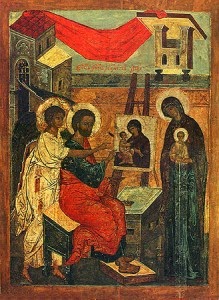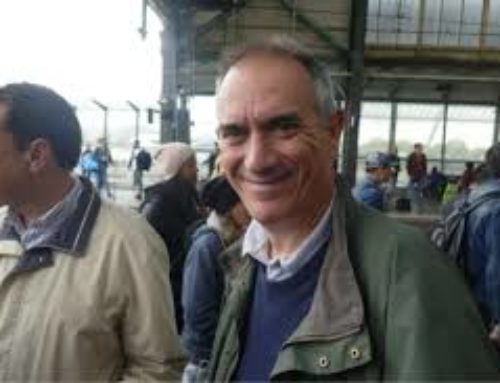Mary, help of the sick
Fr James Hanvey, SJ
There are many icons of Catholicism. Apart from the crucifix, the statue of Our Lady of Lourdes might qualify as one of the most common. It can be seen in Churches or in homes and whether it takes the form of high accomplished art or just the plastic statue bottle that holds the Lourdes water that thousands of pilgrims bring home with them, the image and the reality to which it points remains constant. Lourdes is the great place of pilgrimage for the sick. Over the centuries Mary, the Mother of God, has acquired many beautiful titles that celebrate her continuing place in the unfolding of our redemption and in the community of faith, but in Lourdes we can see that she is ‘mother of the Kingdom’. It is there, most vividly and practically, that the beatitudes can be experienced, for Lourdes is about a reversal – here the sick, whatever the manner of their illness or physical condition, ability or social standing, all have first place. Here, too, you can see the healthy – of every age and nation – practically employed in care. Lourdes is an experience of an unembarrassed Catholicism and an unapologetic faith.
February 11th is the feast of Our Lady of Lourdes; it is also the day which the Catholic Church has marked as the World Day for the Sick. It is especially dedicated to people who are incurably sick or terminally ill. Although the whole Church is asked to make it a special day of prayer for the sick, it will be celebrated in Seoul with a series of liturgical events and conferences. Such days deepen our consciousness of a daily reality which is not just physical but spiritual and social. As always in the Church, liturgy and prayer lead to action and sustains it. It is a call to transform and transcend those structures and attitudes that block our human solidarity and deprive people of basic needs. The World Day for the Sick reminds us that so much sickness is preventable through basic hygiene and clean water. So much sickness and suffering is preventable if medicine is made affordable and available. In the case of terminal illness, we are asked to extend the great well of practical compassion and care, so evident at the waters of Lourdes, to all in society. In our own country and through the world so many die alone or without adequate palliative care, not because we do not have the economic means to prevent it, but because we do not have the vision to see them. How we die is as important as how we live and how we care for a person in the final stage of life is a measure of how we value every person in their vigour and productivity.
The World Day for the Sick is a moment when we experience the fact that sickness, even terminal illness, does not cut us off from the community. It also reminds us that illness is never just a physical event, it is unavoidability spiritual even when we don’t believe. Within it hovers the reality of our own frailty and mortality, our value and purpose. We realise that ultimately we are not autonomous and in control but dependent and in need – as the Zulu saying has it, ‘people are people through people’. Even more than in its physical dimension, sickness is a counter-cultural moment of terror. But within it comes this other reality, that there are those, maybe even those we do not know, on whom we have no special claim, who care for us. They will spend their time and energy in seeking our good and care enough to want what is right and just for us. Sickness crosses all our boundaries and opens up a world of unexpected gift. This world surrounds us even in our moment of dying, and whether we are conscious of it or not, keeps a vigil for us. All our life is lived in this communion. It does not come just from our common humanity but from the Love in whose image we are made.
This communion means that sickness, even if it leads to death, is never useless. In such moments Christian faith is not some ‘opiate’ for those who have not the stoic’s strength. Faith does not pretend that illness is other than it is, nor does it celebrate suffering. It just tries to let it become a moment of encounter. At this point faith must let itself become mystical.
Christianity does not ask that we should be heroic and self-determining when faced with suffering or death, only that we should trust and step out into the mystery of Christ – it is a moment when our life is given a Eucharistic form: “Through Him, with Him and in Him, the unity of the Holy Spirit, All Glory and Honour is Yours, Almighty Father.” Through such and offering in faith, a life can catch, hold, and reflect the redemptive light for us all.
The state of societies can be measured in many ways, but it may be in our care of the sick and the dying that we have the one of the best indications of our social health. The feast of our Lady of Lourdes and the World Day of the Sick may point us towards the sources of healing that we all need.
Prayer to Mary, Health of the Sick
O Virgin Mary, «Health of the sick»,
you who accompanied Jesus on the way to Calvary
and remained near the cross on which your Son died,
participating intimately in his suffering,
take our suffering and unite them with His,
so that the seeds sown during the Jubilee
continue to produce abundant fruits in the coming years.
Most tender Mother, we turn to you with confidence.
Obtain from your Son the strength to return soon,
completely restored, to our duties,
so that we be useful to our neighbour through our work.
Meanwhile stay with us at the moment of trial
and help us to repeat everyday with you our yes,
sure that God will bring out from every evil a greater goodness.
Immaculate Virgin, may the fruits of the Jubilee Year
be for us and for our dear ones
a pledge of renewed vigour in Christian life,
so that in the contemplation of the Face of the Risen Christ
we will find the abundance of the mercy of God
and the joy of a more complete union with the brethren,
the beginning of the joy without end in heaven. Amen.
Pope John Paul II










